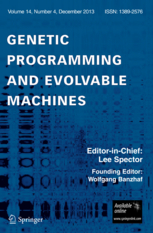
GPEM - Genetic Programming and Evolvable Machines, Journal of
Publisher: Springer. Sponsored by AAAI
ISSN: 1573-7632 (electronic version)
ISSN: 1389-2576 (print version)
Editor-in-Chief: Lee Spector, Hampshire College, USA
Editorial Board
Year Range: 2000 - Current Year
Numbers per year: 4
Official Homepage: http://www.springer.com/computer/ai/journal/10710
Access: abstracts and some full-texts available
Read this Journal on Springerlink: Online First Articles | All Volumes & Issues | Free: Sample Articles | GPEM blog
Fields of study: Genetic Programming, Evolutionary design and Optimization of electronic circuits and mechanical devices, Artificial Evolution of programs and machines
The journal of Genetic Programming and Evolvable Machines is devoted to reporting innovative and significant progress in automatic evolution of software and hardware.
Methods for artificial evolution of active components, such as programs or machines, are rapidly developing branches of adaptive computation and adaptive engineering. They entail the development, evaluation and application of methods that mirror the process of neo-Darwinian evolution and produce as a result computational expressions such as algorithms or machines such as mechanical or electronic devices that actively process environmental information and transform their environment.
Specific topics of interest include, but are not restricted to:
■ Methods:
• Genetic Programming;
• Variable-size evolutionary algorithms;
• Induction of algorithms and symbolic expressions by iterative and non-deterministic search;
• Evolutionary design and Optimization of electronic circuits and mechanical devices;
• On-line adaptation of hardware and software;
• Evolutionary robotics;
• DNA computing;
• Coevolutionary techniques;
• Meta-learning;
• Hybrid systems;
• Cellular and Developmental approaches.
■ Task Domains:
• Algorithm evolution;
• Agents;
• Architecture;
• Art and animation;
• Classification and pattern recognition;
• Computer graphics;
• Computing;
• Circuit design;
• Data mining;
• Distributed problem solving;
• Engineering design applications;
• Games;
• Hardware and software testing and verification;
• Image and signal processing;
• Interactive evolution;
• Molecular biology applications;
• Music;
• Natural language processing;
• Network routing;
• Optimization;
• Process control;
• Robotics and motor control;
• Self-repair;
• Self-reproduction of software and hardware, Self-programming;
• System modeling.
A unique source reporting on methods for artificial evolution of programs and machines:
- Reports innovative and significant progress in automatic evolution of software and hardware.
- Features both theoretical and application papers.
- Covers hardware implementations, artificial life, molecular computing and emergent computation techniques.
- Examines such related topics as evolutionary algorithms with variable-size genomes, alternate methods of program induction, approaches to engineering systems development based on embryology, morphogenesis or other techniques inspired by adaptive natural systems.
Methods for artificial evolution of active components are rapidly developing branches of adaptive computation and adaptive engineering. They entail the development, evaluation and application of methods that mirror the process of neo-Darwinian evolution. Genetic Programming and Evolvable Machines reports innovative and significant progress in automatic evolution of software and hardware. It features both theoretical and application papers and covers hardware implementations, artificial life, molecular computing and emergent computation techniques.
Related subjects: GPEM blog
Genetic Programming and Evolvable Machines (журнал - печатное и электронное издание)
Издатель: Springer
Годы выпуска: 2000 - настоящее время
Периодичность выпуска: 4 номера в год
Официальный сайт: http://www.springer.com/computer/ai/journal/10710
Доступ: свободный, доступны аннотации и полные тексты
Просмотр на Springerlink: Online First Articles | All Volumes & Issues | Free: Sample Articles | GPEM blog
Области исследований: Искусственная эволюция программных и аппаратных средств



